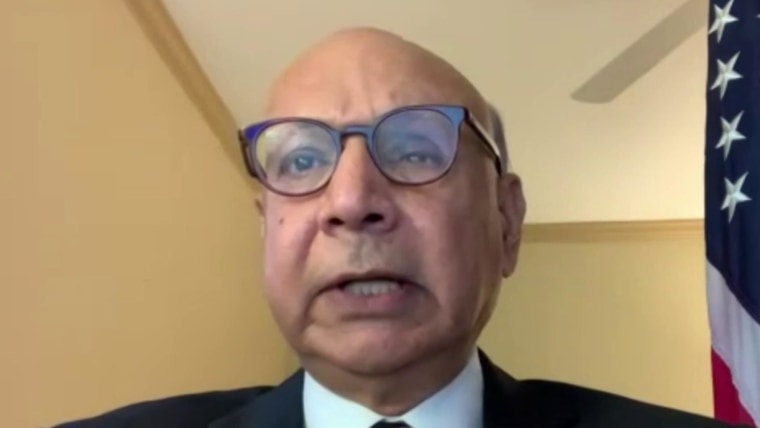WASHINGTON — The summer is coming to the close of an even-numbered year and Democrats are up in the polls, which means it’s time for them to freak out about the upcoming election.
Democrats are nothing if not a self-doubting bunch, and the 2016 election left such a psychic scar that many in the party are now conditioned to assume they’ll somehow blow it again and snatch defeat from the jaws of victory.
Nominee Joe Biden continues to lead President Donald Trump in every battleground state, and Trump’s “law and order” message doesn’t seem to be working. But some recent polls showing the race tightening a bit were enough to send liberals’ blood pressure soaring along with Google searches for “Joe Biden lose” in blue states like Maryland and California.
The question is how to respond to the “bed-wetting,” as former Obama campaign manager David Plouffe memorably called the liberal tendency to see only the dark linings of silver clouds. After all, the bed-wetters were right in 2016 and the Pollyannaish data gurus, including Plouffe, were wrong in making voters feel Hillary Clinton had that race in the bag.
While it’s difficult to quantify, political insiders have long seen liberals as more skittish about their own shadows than conservatives.
“While bed-wetting is not an affliction exclusive to a party, Democrats do seem to have a special affinity for it,” former Obama adviser Dan Pfeiffer wrote before the 2016 election.
On the conservative outlet Breitbart, recent headlines cherry-pick the polls with good news for Trump and downplay the ones with bad news. But while conservatives assume unfavorable polls must be skewed, liberals sometimes have a tendency to question the ones with good news and put stock in the polls with gloomy news.
“Someone needs to pull the fire alarm NOW,” liberal filmmaker Michael Moore tweeted to his 6 million followers, citing a survey by a Republican pollster that showed Trump had pulled into a narrow lead in Moore’s home state of Michigan. “DANGER!”
On the Daily Kos, the liberal blog’s founder, Markos Moulitsas, felt the need last week to tell his readers to “chill the f’ out” and assure them that “it’s OK to feel good about these numbers!”
“There’s this obnoxious liberal tendency to have to catastrophize the news,” Moulitsas told NBC News. “Fact is, no one is motivated by losing. People are motivated by winning, which is why conservatives have built an entire apparatus to declare victory, no matter what reality says.”
“That doesn’t mean people will go home and tune out the election. It means that people will be extra motivated to finish the job,” he added.
Trump’s win despite the polls only supercharged that anxiety. It confirmed the doubts and obliterated the ability to have faith in the cold, hard data, like finding out reality was cheating on you the entire time.
“Democrats under Trump have a bad case of Charlie Brown syndrome: They can’t stop being afraid that the ball is going to get yanked out from under them,” said Jared Leopold, a former top aide to Washington Gov. Jay Inslee’s Democratic presidential campaign. “It happened in 2017, 2018 and 2019, where many Democrats panicked before big wins.”
“The truth is that Donald Trump isn’t magic. He’s an incumbent on Labor Day in the low-to-mid 40s in head-to-head polls,” Leopold said. “Once you get past the panic, any level-headed analysis would show that it’s a hell of a lot better to be Joe Biden than Donald Trump right now.”
Pollsters at the University of Southern California’s Dornsife Center for Economic and Social Research discovered an interesting phenomenon last week when they asked voters not only whom they supported, but whom they expected others would vote for.
The poll showed Biden with a healthy 11 percentage-point lead overall. But Biden’s edge shrank to 5 percentage points when respondents thought about whom people in their social circle would vote for. And it virtually disappeared to 1 point when respondents considered how people in their state would vote.
“One potential explanation for Biden’s significantly smaller lead resulting from these methodologies is that Democratic voters were surprised by Trump’s victory in 2016 and are particularly nervous about the outcome of this election,” said Jill Darling, polling director for USC Dornsife.
But maybe, some Democrats say, the anxiety is productive.
Robby Mook ran Clinton’s 2016 campaign, when an unknown number of Americans didn’t bother turning out to vote because they were sure the former first lady would win and didn’t need their vote.
“What value do we get from convincing ourselves we are certain to win? And what is the downside of assuming we are 20 points down and working like heck to win?” Mook asked.
For its part, the Biden campaign is used to dealing with second-guessing from party insiders, pundits and its own supporters.
The campaign got off to a less-than-auspicious start with a fourth-place finish in Iowa followed by a fifth-place finish in New Hampshire, so the campaign received plenty of unsolicited advice about how to turn around what was widely perceived as a disorganized operation heading into the general election.
“We’ve been handing out rubber sheets for a year and half,” said one Biden adviser who requested anonymity to speak candidly about other Democrats.













